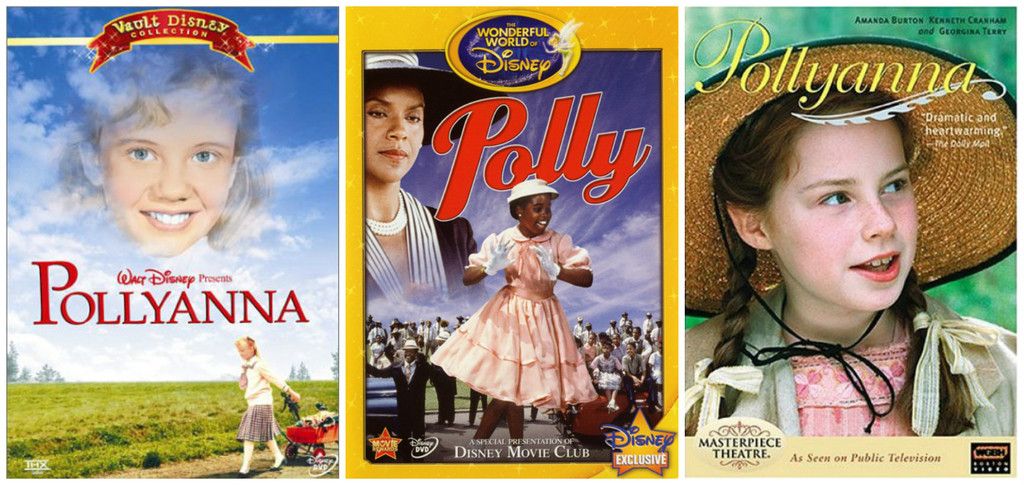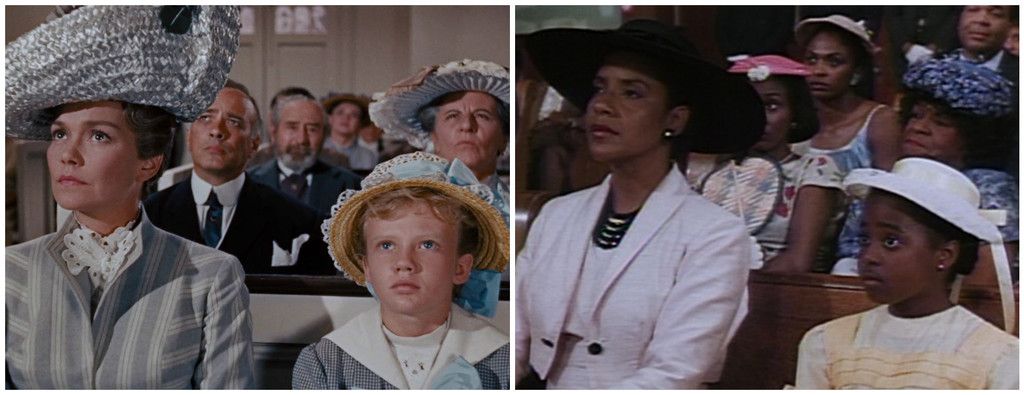Film Comparions: Pollyanna vs. Polly
Pollyanna (1960), with Hayley Mills
vs.
Polly (1989), with Keshia Knight-Pulliam

Covers of three Pollyanna productions: Pollyanna (1960), Polly (1989), and Pollyanna (2003)
I mentioned in my review of The Trouble With Angels that Hayley Mills is one of my favorite child actresses. And probably Hayley's most famous childhood role was as the optimistic orphan Pollyanna, which introduced her to American audiences and earned her an honorary Academy Award (it was presented by Shirley Temple, then in her 30's, who'd also gotten a mini Oscar as a kid). Keshia Knight-Pulliam was best-known for her role on The Cosby Show, but she also did several TV movies as a kid, including Polly, an African-American Pollyanna remake.
As the title characters, Hayley and Keshia both give good performances with a lot of charm. But unless (like me) you're already a fan of Hayley or have nostalgia for the movie, you might find her Pollyanna a little too saccharine. She was about 13 during filming but looks much younger, and the movie emphasizes her wide-eyed innocence, cutesy smiles, and optimism more than it should, making her come off as unrealistically perfect. Her performance is most appealing when she just gets to act like a regular kid, like in the scenes of Pollyanna and her friend Jimmy (Kevin Corcoran) playing by the creek.

Pollyanna and Polly in church with her aunt
Keshia's Polly (who hails from Detroit, rather than the British West Indies) is a refreshing contrast to Hayley's Pollyanna. She's still optimistic and cheerful, but she also has a little bit of a fun, sassy edge. For example, in the 1960s film, when Nancy and George need to distract Pollyanna, they take her out for ice cream, but here, it's Polly who hints to the grown-ups that they can buy her silence with ice cream. This production also makes Polly and Jimmy the same age (there was over a three-year age difference between Hayley and Kevin) and gives them a cute little romance. It helps that Brandon Quintin Adams, as the '89 Jimmy, had tap-dancing skills to rival Shirley Temple.
But although Keshia's character is edgier, her movie as a whole is pretty dull. In Pollyanna, the strong adult cast and high production value save much of the movie from the storyline's inherent schmaltz. Jane Wyman (as Aunt Polly) and Karl Malden (Reverend Ford) are both really excellent at creating realistic, conflicted characters. Some of the dialogue is surprisingly deep and smart for a feel-good family movie, like when Pollyanna yells at cranky old Miss Snow (Agnes Moorehead, Jane Eyre 1944) to "forget about dying, and be glad you're living," and when she tells Reverend Ford about searching for the good in his congregation, rather than the bad. The reverend is so moved by this that he falls to his knees - it's a powerful moment, and Malden knocks it out the park.
One of the central storylines in Pollyanna is the town bazaar, and after the build-up, the bazaar scenes deliver a lot of payoff. Although Hayley Mills singing "America the Beautiful" in her British accent is a little ridiculous, there's such a strong, fun atmosphere. But as a TV movie with a smaller budget, it's understandable Polly can't deliver the same production value. Polly falls out of the tree and gets paralyzed on her way to the bazaar, not on her way home from it, so the bazaar scenes are sadly absent.

Pollyanna and Polly visit Miss Snow
But what really hurts Polly is that it's a musical. Some of the songs work well, like the catchy "Honey Ain't Got Nothin' on You," sung while Polly is shopping for new clothes (this is a wordless montage in Hayley's film), and Polly and Jimmy's song-and-dance number "Angel Eyes." But most of the songs just get in the way of character development. For example, in the 1960 film, after an argument with her old flame Dr. Chilton (Richard Egan), Aunt Polly holds her head high in front of her servants, then breaks down crying in her room. Wyman's excellent acting shows us her conflict and regret. But in the 1989 version, after Aunt Polly (Phylicia Rashad) argues with Dr. Shannon (Dorian Harewood), the film doesn't show us anything. It tells us everything by having Aunt Polly sing a song about how she feels, "Something More." It's not nearly as interesting to watch.
Other key elements from the original film are thrown out to make room for the songs: Polly's "Glad Game" has a much smaller part, and her father's locket is completely gone. Miss Snow's changed outlook on life takes place mostly offscreen, and Celeste Holm, who plays her, isn't convincing at all as a mean character. (In her late 50's, Agnes Moorehead, Hayley's Miss Snow, wasn't nearly old enough to play the allegedly old woman, but she could play mean. There was a reason she was cast as hateful Aunt Reed in Peggy Ann Garner's Jane Eyre.) Malden's performance as Reverend Ford would be hard to match, but Larry Riley, as the '89 reverend, is so cartoony that he doesn't even seem to be trying.
Other reviews of Hayley's films: The Trouble With Angels (1966).